#socialist strategy
Explore tagged Tumblr posts
Text

15 notes
·
View notes
Note
asking u cuz u seem at least a few notches above ur average tumblr “communist”. what (if anything) works of kautsky are worth reading?
The Class Struggle, The Social Revolution & The Road to Power
Will add that Kautsky made some hard breaks with Marxism through the 1910s and 1920s (this is why Lenin and Luxemburg criticize him for), so late Kautsky and early Kautsky read like two different people sometimes.
Also recommend Mike Macnair's Revolutionary Strategy (he derives a lot of his politics from Marx, Kautsky and Lenin).
#kautsky#karl kautsky#socialist#socialism#communism#communist#communist strategy#socialist strategy#class struggle#revolution#social revolution#road to power#workers power#soviet power#lenin#leninist#leninism#marx#marxist#marxism#karl marx#leftist#leftism#leftwing#left wing#anarchist#anarchy#anarchism#anarchist communism#anarchist communist
5 notes
·
View notes
Text
Same reason why Confederate monuments or Nazi statues should be blown up.
Not a Stalinist. Also not some rightist who thinks that religion is compatible with communist let alone Bolshevism or Marxism.
So far as the party of the socialist proletariat is concerned, religion is not a private affair. Our Party is an association of class-conscious, advanced fighters for the emancipation of the working class. Such an association cannot and must not be indifferent to lack of class-consciousness, ignorance or obscurantism in the shape of religious beliefs. We demand complete disestablishment of the Church so as to be able to combat the religious fog with purely ideological and solely ideological weapons, by means of our press and by word of mouth. But we founded our association, the Russian Social-Democratic Labour Party, precisely for such a struggle against every religious bamboozling of the workers. And to us the ideological struggle is not a private affair, but the affair of the whole Party, of the whole proletariat.
Lenin: On Religion
'Religion is the opium of the people,' said Karl Marx. It is the task of the Communist Party to make this truth comprehensible to the widest possible circles of the labouring masses. It is the task of the party to impress firmly upon the minds of the workers, even upon the most backward, that religion has been in the past and still is today one of the most powerful means at the disposal of the oppressors for the maintenance of inequality, exploitation, and slavish obedience on the part of the toilers. Many weak-kneed communists reason as follows: 'Religion does not prevent my being a communist. I believe both in God and in communism. My faith in God does not hinder me from fighting for the cause of the proletarian revolution.' This train of thought is radically false. Religion and communism are incompatible, both theoretically and practically. Every communist must regard social phenomena (the relationships between human beings, revolutions, wars, etc.) as processes which occur in accordance with definite laws. The laws of social development have been fully established by scientific communism on the basis of the theory of historical materialism which we owe to our great teachers Karl Marx and Friedrich Engels. This theory explains that social development is not brought about by any kind of supernatural forces. Nay more. The same theory has demonstrated that the very idea of God and of supernatural powers arises at a definite stage in human history, and at another definite stage begins to disappear as a childish notion which finds no confirmation in practical life and in the struggle between man and nature. But it is profitable to the predatory class to maintain the ignorance of the people and to maintain the people's childish belief in miracles (the key to the riddle really lies in the exploiters' pockets), and this is why religious prejudices are so tenacious, and why they confuse the minds even of persons who are in other respects able.
N. Bukharin & Y. Preobrazhensky, ABC of Communism Chapter 11: Communism and Religion

The medieval Saint Michael's Golden-Domed Monastery in Kyiv, Ukraine, shortly before it was demolished by the Soviets in 1935. X
#communism#communist#socialism#socialist#socialist strategy#communist party#workers power#workers councils#communist left#left communist#left communism#leftcommunism#leftcommunist#pannekoek#trotsky#leon trotsky#trotskyism#trotskyist#marx#marxism#marxist#karl marx#lenin#leninist#leninism#vladimir lenin#atheist#atheism#secular#secularism
129 notes
·
View notes
Text
Some better news for today, the Austrian communist party saw a huge increase in votes in last Sundays local election in Salzburg putting them on tack to establish a second communist mayor in a major Austrian city after Graz! They are on this run partially because they are the only real leftwing opposition in the country but also by standing by their commitment against capitalism and, probably most importantly, their commitment to provide local services like tenant organising, minor financial aid and legal advice for tenants!
Organising works!
#socialist orgs must find new strategies to become relevant again#and the KPÖ is at the forefront of this strategizing#communism#socialism#austria#kpö#elections#europe#politics#antifascism#jonesposting
5 notes
·
View notes
Text
me thinking about literally any ship from disco elysium: this too is dialectics
#now it's cindy and liz...#you know. a member of a criminal gang and a lawyer. complete opposites#but they both want a world that's free of exploitation... they're both want a better socialist world#so in this case they're the same#so they're basically two sides of the same coin of leftist strategies idk...
2 notes
·
View notes
Text
All the takes are correct and yet they also miss the point. Yes, it was insane for the Democrats to think they could win by running a soulless candidate, without a shred of progressive policy vision, pursuing endorsements from neocon war-hawks everybody hates, while arming and funding a genocide, and belittling and crushing those who have enough morality to protest it. It is enraging that the Democrats are so smug and blind to this. But these are all just symptoms. The deeper reality is that liberalism has failed, liberalism is dead, and people urgently need to wake up to this fact and respond accordingly. It is a defunct ideology that cannot offer any meaningful solutions to our social and ecological crises and it must be abandoned. Democrats have proven over and over again that they cannot accept even basic steps like public healthcare, affordable housing, and a public job guarantee - things that would dramatically improve the material, social and political conditions of the working classes. And they cannot accept a public finance strategy that would steer production away from fossil fuels and toward green transition to give us a shot at a liveable future. Why? Because these things run against the objectives of capital accumulation. And for liberals capital is sacrosanct. They will do whatever it takes to ensure elite accumulation, it is their only consistent commitment. At home, they suppress and demonize progressive and socialist tendencies. Abroad, they engage in endless wars and violence to suppress input prices in the global South and prevent any possibility of sovereign economic development. The Democrats have done all this purposefully and knowingly, for my whole life, not as some kind of "mistake" but in full consciousness that it is in the interests of capital. And because liberalism cannot address our crises, and because it crushes socialist alternatives, it inevitably paves the way for right-wing populism. They know this pattern, and yet they risk it every time - this election being only the most recent example. They did it in 2016, when they actively crushed the Sanders campaign and sent Trump to the White House. They do it because ultimately they (and I mean the liberal ruling class here) don't really mind if fascists take power, so long as the latter too ensure the conditions for capital accumulation. They 100% prefer this to the possibility of a socialist alternative. So, progressives have to face reality. The dream of "converting" the Democratic party is dead. This is now a fact and it must be accepted. The only option is to build a mass-based movement that can reclaim the working classes and mobilize a political vehicle that can integrate disparate progressive struggles into a unified and formidable political force and achieve substantive transformation. This will take real work, actual organizing, but it must be done and that process must begin now.
Jason Hickel
8K notes
·
View notes
Text
We need to start doing this here in the US! Biden is going to be signing away our freedom as a nation!
12 notes
·
View notes
Text
BIng ai Image creator with the prompt being Jean Bauldrairds essay "requiem for the media" and its other subsections as the prompt in different styles
Requium for the media, Enzensberger: A "Socialist" Strategy,Speech without Response,Subversive Strategy and "Symbolic Action",The Theoretical Model of Communication,The Cybernetic Illusion. Art Deco, Russian Cosmism, Anime,
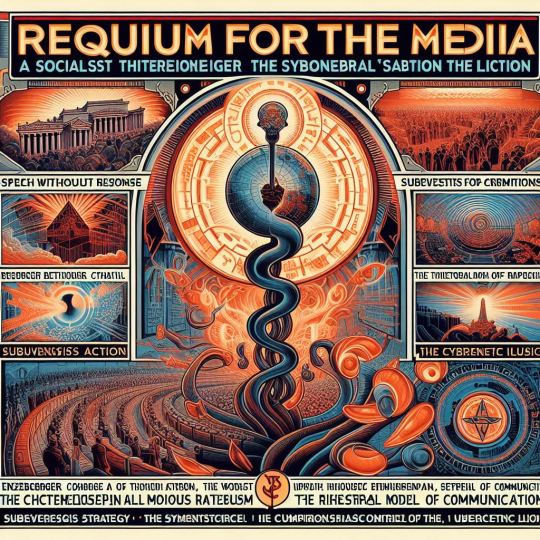
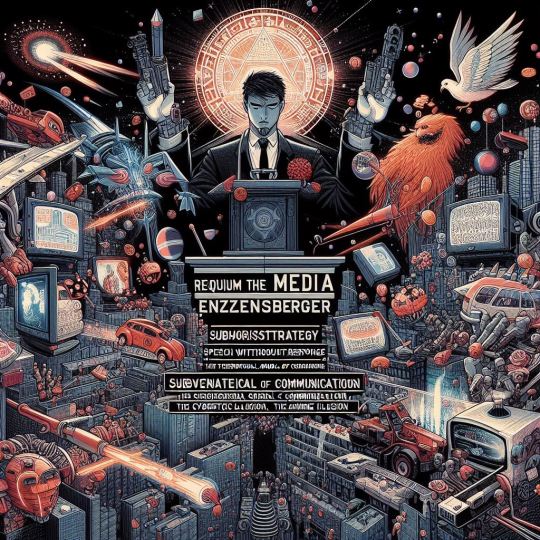
Requium for the media, Enzensberger: A "Socialist" Strategy,Speech without Response,Subversive Strategy and "Symbolic Action",The Theoretical Model of Communication,The Cybernetic Illusion., Cinematic
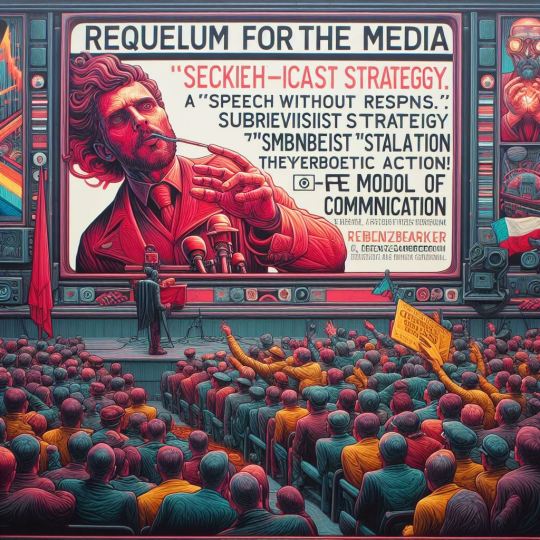
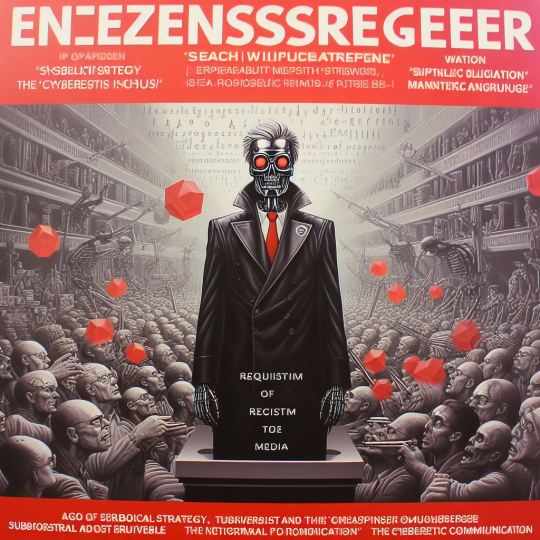
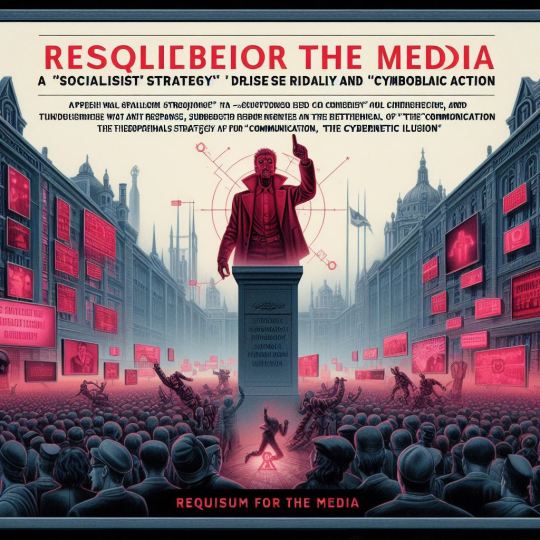
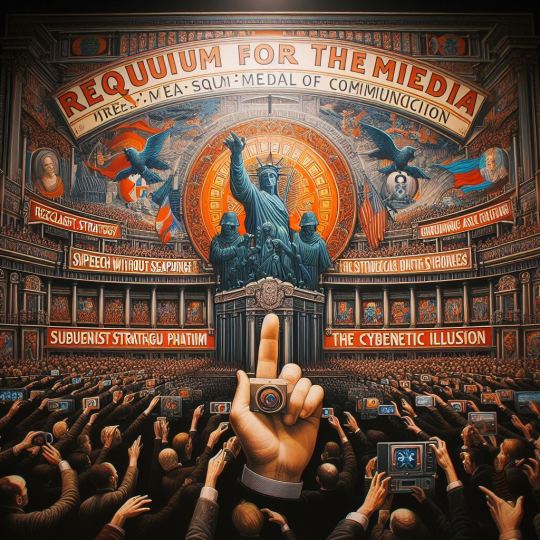
#Requium for the media#Enzensberger: A “Socialist” Strategy#Speech without Response#Subversive Strategy and “Symbolic Action”#The Theoretical Model of Communication#The Cybernetic Illusion.#Comic#ai art#Art deco#cinematic
0 notes
Text
Me and Greg talk about this in the newest episode of Red Connections but the reason nobody will ever “take one for the team” and do something that directly threatens capitalist hegemony is because the only thing that leftist organizing in America is doing is working on improving people’s quality of life and playing damage control. We all have too much to lose, union jobs to fight for, etc. — why would we throw that all away going to jail for sabotaging a weapons factory or something? I am by no means saying that purposefully making people’s lives worse on purpose so they have less to live for is a viable strategy either (that is where we’re headed regardless, though!). The left, the fucking DSA and PSL and SRA or whatever need to pool their resources together on SOME kind of a limited united front that provides legal defense and solidarity for everyone who takes actions that risks their careers by putting them at odds with capital. People need to be allowed to openly oppose the state and still have a LIFE to fall back on rather than just fucking dying alone in a blaze of glory. Housing, armed protection from fascists, shelter from the state, anything at all to give people an alternative way of having some semblance of a life after putting themselves at odds with the status quo. “Building power” and creating a parallel structure at odds with capitalist society is not this incrementalist getting socialists on the city council bullshit that we’ve already been trying to do for decades. Dual power means moving as a bloc capable of taking action and sheltering ourselves from retaliation by the state and capital - we can’t rely on the bravery of individuals who are willing to throw their lives away setting themselves on fire or assassinating a CEO, we need to provide people with a livable alternative to the system they put themselves in opposition to.
456 notes
·
View notes
Text
so the thing about "read theory" as a mantra: in the social media sphere there is a consistent downplaying of what that kind of commitment actually entails, plus a consistent obfuscation of what exactly the commitment is necessary for.
let's say that you're interested in learning more about specifically "Marxist theory." This, I think, also raises a bunch of questions about what we mean by theory - works of political philosophy, texts on revolutionary and military strategy, political speeches, journalistic or sociological analysis, historiography - these varying things with very different discursive norms and standards of evidence or logic often get rolled into one singular object called "theory." but let's set that aside for now.
you want to learn this for maybe an assortment of reasons, here's a few (non-exhaustive) good ones:
Marxism has been a substantial historical force that has probably had a notable impact on the world around you in some way.
Learning about Marx/ism might offer some level of insight into your current social world that other things are unable to offer.
Many texts - Capital, The Wretched of the Earth, The Second Sex, The State and Revolution - are also world-historical forms of political literature, which is interesting.
Follow-up to 2 - maybe having some level of familiarity with these things will give you the ability to better articulate yourself and participate in social and political movements around you.
generally speaking the Social Media Marxist approach is to tell you to go read off a list of texts of whatever writers the author personally agrees with or whatever works she happens to have read. so you decide to start with the big guy Marx, who is at the top of the list. totally reasonable decision.
however, there are a few contextual questions that might reasonably come up when doing so.
first, it will be clear that Marx did not pop out of an intellectual vacuum; Lenin has a rather popular identification of the "three sources of Marxism" - post-Hegelian German philosophy, French socialism, and English political economy. from my perspective, these are more like three of his main objects of ire (and so in some sense are both influences and also breakages - but not strictly speaking a synthesis), but I digress. so, frequently, in order to grasp what Marx is talking about or responding to, you are going to need some level of familiarity with a lot of additional people: Smith, Ricardo, Malthus, Hegel, Bauer, Feuerbach, Hobbes, Spinoza, Rousseau, Mill, Sismondi. suddenly you are not just learning about the works of one guy, but his attitude towards all the people he relies on for support or aims his criticisms at. and each of those different intellectual relationships is going to be different. sometimes at different times!
second, and relatedly, Marx is not always the most charitable to the people he's criticizing, who were often rival socialists (so there were pretty notable political and personal stakes at work in proving them wrong or diminishing their influence over the movement). the introductory materials to the new translation of Capital also observe that Marx's approach to scholarship is, shall we say, haphazard; often he makes quotes or citations that are not actually representative of what he's citing. finally, many of the people he's criticizing have sort of been rendered obsolete historically *in no small part* due to the success of Marxism as a political orientation in the late 19th and early 20th centuries. so to determine whether Marx is being fair to the people he is basing his critique on, we will have to do some level of intellectual work to check. so now we're not just evaluating Marx's relationship to different thinkers but also the substantial content of each of those thinkers themselves.
third, Marx did not pop out of a social vacuum. all of these different writers didn't just crop up from nowhere but wrote within particular sociohistorical contexts, some of which were rather divorced from the European revolutionary wave, first worldwide financial crisis, and the shifting character of the United States in the wake of the Civil War and the formal abolition of slavery - some of the historical events that Marx was more explicitly engaging with. and the radical liberals, republicans, and socialists Marx criticized all also had their own intellectual and social histories. so now we're getting a little far afield from the initial notion, which was just to read some guy, and getting into the realm of social history, and trying to understand the relationship between world history and the ideas produced within it.
fourth, you are a subject in the world, which is to say YOU did not pop out of a social or intellectual vacuum. you likely bring predispositions, assumptions, biases, and cognitive distortions to what you read; we all do. working through those and trying to note where they're happening - where they might be fine and where they might be problematic - will require a certain willingness to reflect, to write, to take notes, to analyze and self-scrutinize, and to be critical of both yourself as a reader and of the text you are reading. (a nested problem is that we have a truly staggering amount of material from Marx and Engels, and you might have to make certain determinations as to which material is important or worthwhile or more useful, and identify the standards by which you think that - all of which requires a certain reflection on your status as a political thinker).
okay, so consider all that. we started with "I wanna read this one guy," we end with "to really grasp the work of this one guy it's also important to know both preceding and contemporaneous world history, his intellectual influences, and the gaps or silences or errors in his work.” now consider that, if you really want to be able to speak on them with some level of confidence and intellectual honesty, you have to apply approximately the same level of rigor to every other writer on the Social Media Marxist approved list - Lenin, Fanon, Che, Kollontai, Cabral, Mao, Luxemburg, whoever. not to mention their critics, both direct and indirect!
Marx developed his work through an incredibly sustained engagement with enormous volumes of different material; we have entire notebooks of him poring over Max Stirner, or Spinoza, or the political economists, or the empirical observations of English factory inspectors. I'm not saying that you have to do that, or even that one strictly *has* to go down any or all of the first three rabbitholes I identified. Marx was in the somewhat unique position of sustaining himself through the support of Engels and his journalistic work, as a product of being in perpetual exile. that's not the kind of position that most of us are typically in.
the point is not "commit yourself to being a perfect monastic scholar in order to reach perfect truth" - such a thing is probably a fantasy, even if we wish otherwise. the point is that if you think "theory" is worth taking seriously, well, you have to actually take it seriously. if you don’t think it has stakes or utility, that’s fine; different people find different things useful. I think “theory” is not a set of dead letters by canonical authors but produced through social life. but if “reading theory” is a way to clarify and assert yourself as a political subject and agent, to claim some intellectual autonomy and acquire some understanding that you can put into practice in your life, then that’s demanding. it’s not impossible, but it does take real effort and a commitment to study and a certain level of resistance to being dogmatic. otherwise you are just letting yourself be rhetorically persuaded by whatever is in front of you or whatever affirms your biases.
as Marx says in the preface to Capital, Volume I, "I am of course assuming that my readers will want to learn something new, and so are ready to think for themselves."
889 notes
·
View notes
Text
The fact that Mira and Spectra have the Charisma to make you join there white "Safe the world" proyect makes me wonder if that's from Family or Clay educated them to be like that...
parallels between gus and ace that i wanted to showcase.
ace and gus were both strong battlers known for their prowess in the battle tournaments.
mira and spectra fought them and won.
ace and gus are recruited shortly after. ace learns the truth about the bakugan after hearing their voices, gus joins spectra's cause after "seeing the light."
ace and gus each make a promise to help carry out their leader's ambition.
ace and gus both think about their respective leader as they're about to die.
the jealousy of their leader's sibling. need i say more lol.
#spectra phantom#mira fermin#or maybe Ace and Gus are just really weak minded and they get influenced by whatever shit they are told LMAO#Spectra is using the tactic of deidification from some cults make to make you think that they are the answer#something that kings and emperors use in the past#Meanwhile Mira appeals more into the manipulation of “a better change” something that big organization#I mean is not bad but we is interesting that Spectra is appeling into a more concervative point of view and Mira is more socialist strategy
53 notes
·
View notes
Text
Although i certainly find universal nuclear disarmament to be a morally correct and honourable goal, it's also very clear that a reasonable part of those campaigning for it are very entrenched in anti-communist views - focusing with much strictness on the development of nuclear warheads by the DPRK, China and Russia (which isn't socialist, but nevertheless). At best they criticize the gigantic war industry of the US, but only by liberal metrics of "we should only have the necessary" and stuff like that. However, it is also clear that the development of nuclear armament - although not the main priority - should, very clearly, be something that socialist states now and in the future must consider. Even if not full blown nuclear armament - at least ICBMs and others like it. For it is not a mistake or an insanity that the DPRK, for example, has developed nuclear warheads; it knows that it is the subject of constant international harassment and it is prepared to have what is, for now, the most powerful rhetorical weapon against this. Future socialist countries should, yes, follow this! And, you see, a big number of communists mainly in the West (and to great extents elsewhere) do not see military strategy and development post-revolution as important. And this is stupid! Foolish! Russia was the subject of an inter-imperialist gangbang from all sides, and it only survived to form the Soviet Union with the development of a strong, renewed Red Army, big in bulk and in equipment. And socialist revolutions in the future will also need to have this: they'll need a Red Army, Red Navy and Red Air Force. And communists NOW should think about how this needs to be developed and need to learn strategy and need to be active within military circles (although, of course, in the imperial core the military is a much clearer peon of international capital than in the global south, so things are harder in this stance). Socialism here, now and in the future will certainly be striked with the combined forces of capital tumbling down on any form of organized proletariat. This happens to countries contrary to the imperialist USAmerican order, socialist or not: it imposed a military dictatorship in Cambodia in 1970, it couped Chile in 1973, it annihilated Grenada in 1983, it helped oust Aristide in Haiti in 2004, it destroyed Libya in 2011 - not counting many others. This means that developing a strong, truly proletarian armed force and developing means to defend it long term beyond that - ICBMs, and, of course, following the correct Korean path, even nuclear missiles - are crucial for the establishment of socialist states. And only when socialism is triumphant or on its way to triumph may these rhetorical and physical defenses of socialism be dismantled. Or only if the capitalist world surrenders all of it at the same time. However, believe me: they won't. As such, i'd say that in the 21st century, Lenin's little formula can be adapted to: Communism is Soviet power + electrification + ballistic missiles, in a gross simplification. The basis, the development and the defense.
230 notes
·
View notes
Text
"Hitler had campaigned on the promise of draining the 'parliamentarian swamp'—den parlamentarischen Sumpf."
--Timothy W. Ryback, The Atlantic, Jan. 8, 2025

Ninety-two years ago this month, on Monday morning, January 30, 1933, Adolf Hitler was appointed the 15th chancellor of the Weimar Republic. In one of the most astonishing political transformations in the history of democracy, Hitler set about destroying a constitutional republic through constitutional means. What follows is a step-by-step account of how Hitler systematically disabled and then dismantled his country’s democratic structures and processes in less than two months’ time—specifically, one month, three weeks, two days, eight hours, and 40 minutes. The minutes, as we will see, mattered. [...] Joseph Goebbels, who was present that day as a National Socialist Reichstag delegate [when the Reischstag voted to give Hitler dictatorial powers], would later marvel that the National Socialists had succeeded in dismantling a federated constitutional republic entirely through constitutional means. Seven years earlier, in 1926, after being elected to the Reichstag as one of the first 12 National Socialist delegates, Goebbels had been similarly struck: He was surprised to discover that he and these 11 other men (including Hermann Göring and Hans Frank), seated in a single row on the periphery of a plenary hall in their brown uniforms with swastika armbands, had—even as self-declared enemies of the Weimar Republic—been accorded free first-class train travel and subsidized meals, along with the capacity to disrupt, obstruct, and paralyze democratic structures and processes at will. “The big joke on democracy,” he observed, “is that it gives its mortal enemies the means to its own destruction.” [emphasis added]
Although I don't believe that Trump is a Hitler, he is a fascist, and he (as well as members of his future administration like Project 2025's Russell Voight) seem to be drawing lessons about how to quickly consolidate power for Trump's second administration from other countries' previous & current fascist/authoritarian governments.
This is a terrifying article, because there are so many echoes of Hitler in the strategies that Trump has suggested he might use here in America, including "draining the swamp" by replacing civil servants with partisans, viewing opposition parties as the "enemy" (and in Hitler's case declaring some of them illegal), using the legal system against political enemies, dismantling the opposition media, attacking academia, scapegoating certain groups of people, considering using the military against civilian protests/"unrest," giving immunity to police who use lethal force, and consolidating power in the executive branch.
This is a gift 🎁 link, so there is no paywall. I encourage you to read the entire article
[edited]
#fascism#hitler#weimer republic#using democratic institutions to overturn democracy#donald trump#parallels#how hitler overturned a democracy in 53 days#the atlantic#gift link
224 notes
·
View notes
Note
What might decolonization in the US after a successful socialist revolution look like? Would there be one big government still? A sort of union of socialist republics? Something else entirely? Honestly I don't know how to ask.
Post-revolutionary decolonization (and realistically, the only kind of meaningful decolonization that is ever happening) in the US is a complicated matter given the relative success of the USAmerican genocidal project. The native population is 1.1% of the total population as of the 2020 census, this means that unlike in other, incomplete, settler projects such as the Sahrawi Republic or Palestine, it isn't feasible to restore the relation of the native population to the totality of the country. Regardless of population proportions though, the main focus of socialist decolonization is the struggle against any conflict between nationalities by removing the economic basis of that antagonism, which would then allow to also begin to remove the cultural elements that reinforced that dynamic of oppression. The focus is not to create more landlords but native, it's to remove the structure around private property in general, and make sure every worker, native or otherwise, receives as is needed. Taking into account the already relative dispossession of native people even before a pre-revolution context, there will have to be a great effort to bring the conditions of native people at the same level of non-native people.
Regarding the form of the new state, this will evidently depend on the form of the US state as the revolution happens. In other countries this would not be such a pressing question, but given the role and strength of the USAmerican bourgeoisie, it's not hard to believe that for any revolution to take place, the US state would need to be considerably weakened. Keeping this in mind, the strategy followed by all hitherto socialist revolutions is to not further fragment the new state. Given the complexity of navigating the construction of the first elements of a socialist economy, with the simultaneous effort needed for security, it would be both counterproductive and hypocritical to explicitly seek the independence of a portion of the population, as a part of the political program, it would be taking two steps forward and one step back. The communist revolution is national in form, because it happens within the structure of the capitalist state, but it is also international in content, because it explicitly repudiates the division of the proletariat along national lines.
We must understand that nationality, as much as it is relevant today and as much as it influences the course of history, is a byproduct of the development of capitalism, and that since it arose from the infrastructure to justify and protect it, it will also have to seize to exist and be replaced with proletarian internationalism for the duration of the transition to socialism-communism. Keeping this in mind, it would be hypocritical and regressive to, after taking control of the state and beginning the transition away from capitalism, to then turn around and divide the working class of the new country into even more national categories than they already are divided into.
The early USSR is a good comparison because of the sheer quantity of national diversity contained within the bounds of the corpse of the Tsarist Empire. The policy of the bolsheviks was neither of Russian supremacy or of immediate splintering into hundreds of nation states. Even during the very complicated and desperate context of the civil war, Finland was allowed its independence without much fuss from the CC, even if they were immediately incorporated into the German sphere via Von Mannerheim. When the 1936 constitution was being discussed, it was Stalin himself who went against the wishes of many bolsheviks to prevent the republics from gaining independence if they wished. No republics requested this however, because the oppressive mechanisms of capitalism and feudalism that had kept them under the Tsar's thumb for centuries had been replaced with an economic system that assured the equal development of all peoples within the USSR. The USSR itself was also not absolutely centralist, and the many constituent republics had varying degrees of autonomy, reflecting in some aspects the structure of democratic centralism.
I don't think the answer is to replicate the USSR, of course. The context and general state of things are very different, but there are lessons to be learnt from this successful, albeit flawed, tackling of the national question. Again though, we can't really speculate on the way that the US will look right before a revolution, and consequently the structures and problems a revolutionary government will have to start from.
200 notes
·
View notes
Note
What are your criticisms of Chavismo and Maduro just out of curiosity?
now i'd like to preface this with a disclaimer that any opposition ghoul would do nothing but sell the country out to the USA and UK every which way in a heartbeat--maduro is better than any alternative, whether that's guaidó or whichever neoliberal puppet they prop up to replace him.
anyway, there were two key problems with chavismo. firstly, it's fundamentally a national-bourgeois led social democratic movement. obviously in an imperialized country like venezuela this made it profoundly progressive, and the achievments of the bolivarian revolution were incredible--chávez cut malnutrition in half, cut unemployment in half, sent millions of children to school and gave millions of elderly people pensions. however, this project of wealth distribution ultimately had to accomodate the national bourgeoisie. which of course on one hand you can argue was completely necessary, but on the other hand allowed the parasitic classes to entrench themselves firmly within elements of the state apparatus and made chavismo as a project entirely incapable of confronting the national bourgeoisie or corruption.
these of course are the realities of 'democratic socialism', of sweeping a socialist into office in a bourgeoise democracy. through some extremely clever political structures, such as the new constitution, communes, and bolicarian circles--he was able to move much more radically than most in his position. but ultimately, he could not escape the fundamental limits of the source and constraints of his power.
the second is that--and this is a very tawdry and obvious piece of analysis--while it is of course admirable and correct that he seized the nation's oil wealth and enriched the country with it--the way he did it was obviously shortsighted. without a sovereign wealth fund, worker's democratic control of the oil industry, or a solid and far-ranging investment plan, he laid the groundwork for some of the current crisis on the assumption that oil prices would stay high forever.
maduro inherited these faults and added far more of his own. during the crisis that began in earnest in 2016, the other shoe dropped wrt oil prices at the same time as the US tightened their murderous sanctions regime. faced with economic crisis, maduro has broadly chosen to move from chávez' strategy of accomodation with the national bourgeoisie to a full on alliance. social programs have been slashed, pensions cut, wages have plummeted, and worst of all, maduro has sold off countless state enterprises in the hope that oft-prayed to benevolent deity, "foreign capital" would miraculously heal the economy. in the course of this he made an enemy of many early chavistas, as well as the leftmost wing of chávez' coalition -- he has mobilized the full force of the bourgeois state against the country's communist party and other genuinely revolutionary movements, most gallingly the marxist-leninist movimiento tupamaro.
so, tldr: chavismo was genuinely radical compared to even your average third-world social democracy--however it remained fundamentally constrained in what it could accomplish by the lack of an actual proletarian state, was unable to rid itself of reliance on the national bourgeoisie for that same reason, and made some very avoidable mistakes in the handling of the nation's oil wealth--maduro inherited those flaws but has been much more accomodating to both national and international capitalists to the detriment of the people of venezuela.
873 notes
·
View notes
Text
The degrowthers are right: There needs to be a lot less physical stuff produced, especially in the way of fossil fuels, and, for anyone with the least sense of justice, this means rich countries consuming less and poor countries consuming more. Such an apparent threat of rich-country austerity meanwhile contains, in truth, the promise of abundance: fewer but more durable goods, less work and more leisure. (Already in the 1990s, the French-Austrian ecosocialist André Gorz wanted to “build the civilization of liberated time” in place of that of wage labor.) The fact that any such global rebalancing of consumption patterns can’t plausibly take place so long as the rich countries of the Global North dictate world history is one more reason that degrowth remains a dead letter under capitalism. It is not, however, the working classes of the Global North that must drastically curtail their lifestyles: The world’s richest 1 percent are responsible for as much carbon emissions as the poorest two-thirds of the global population. Much of the work of degrowth would be accomplished by the dispossession and destruction of the class represented by this sole percentile. As for the idolaters of growth, their god has not only failed but, Cronus-like, has started devouring its children as if these were so many chicken wings. “Growth” fantasizes one kind of fake substance, and “degrowth” another; real intelligence demands attention to how the ingredients of this world are different, not the same. Even so, the advocates of degrowth (a more attractive English word might be Samuel Beckett’s “lessness”) can boast of a sounder moral and political intuition than can the usual apologists for growth: Less stuff, more life! Such an argument may be obviated soon enough, either way, by the specter not of degrowth communism, but of prolonged capitalist contraction. Voters and politicians whistling past the graveyard being prepared for our children may have neglected to consult a recent article in Nature which holds that “the world economy is committed to an income reduction of 19% within the next 26 years independent of future emissions choices” (emphasis mine). Important factors in this bleak outlook include the declining agricultural yields and the massive and unpredictable damage to infrastructure attendant on climate collapse. In other words, even if carbon emissions are somehow reduced through the magic of the market, climate change can be expected to cause about $38 trillion in damages annually by the mid-century, enough to render overall economic growth infeasible. The choice facing the 21st century, then, is likely not between degrowth and growth. It is more likely between a form of capitalist contraction in which prosperity endures for a few but evaporates for the rest of us, and some kind of socialist or communist degrowth in which the well-being of everyone in general prevails over the wealth of anyone in particular. The precise politics of egalitarian degrowth are no more clear to me than they are to Saitō. But universal crisis will license strategies that theory alone could never discover.
26 August 2024
205 notes
·
View notes